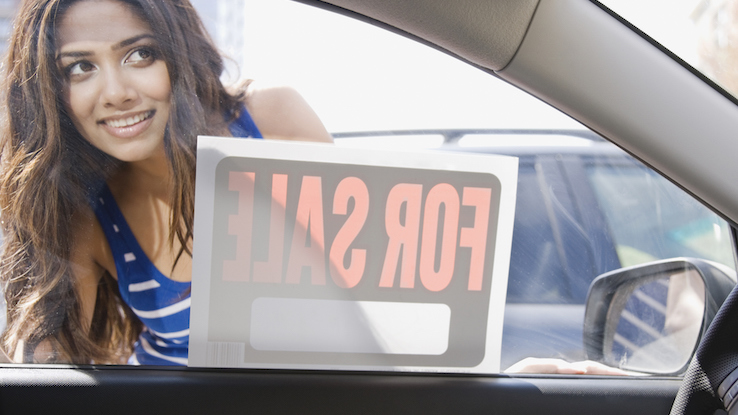Bedroom Makeover Shopping

Can you live without that new-car smell? Buying a used car is a great way to save some money and still get a reliable vehicle that takes you where you need to go. But because you're not the original owner, there can be some variables in what you look at and how you need to shop.
Searching for and purchasing a used car is a lot like shopping for a new car — you'll want to get something that fits your budget and has the look and features you appreciate. But you'll need to examine some additional factors, like a car's condition, when you're buying used. Whether you're already in the market for a used car or are entering the planning stages soon, these tips can help you navigate the process successfully.
The amount of money you can comfortably spend may be the deciding factor in the car you end up choosing — and buying a car isn't usually the smallest purchase, even when you're buying used. If you're not planning to purchase the car outright, some budgeting guidelines can help you determine the appropriate amount.

While there are several ways to determine an amount you can comfortably pay, Interest.com recommends assessing with the 20/4/10 rule first. The premise of this guideline is in the numbers: You should wait to buy a car until you can make a 20% downpayment, you won't finance the car on a loan that lasts longer than four years and the total monthly costs for the car won't exceed 10% of your monthly gross income. Those include the car loan payment, car insurance and any other expenses you anticipate.
If you have other debts you're paying down, such as a mortgage or student loans, you can also use a different 20% rule. That is, you shouldn't spend more than 20% of your monthly gross income on repaying debts every month. So, say you earn $4,000 a month; 20% of this is $800, which is your amount available to pay toward debts. Your only other debt is a $350 monthly student loan payment which, when subtracted from $800, leaves you $450 to put towards a car payment and car insurance. That's still around the 10% of the 20/4/10 rule, too. Figure out 20% of your monthly income and subtract your current monthly debts from it; the final product is the amount you can afford for everything related to a car.
Figure Out Your Must-Have Features
As much as you might want a sporty convertible, it's important to put your needs first when you're purchasing a used vehicle. Take some time to think about how you'll be using the car and what features will make it most usable for you. Do you have a longer commute and want something that'll save on gas? A compact sedan or hybrid car might be ideal. Do you have a large family you need to drive around to different appointments, practices and schools most days? A minivan or larger SUV could be your best bet. Or are you planning on using the vehicle for work purposes, like transporting supplies for your lawn-care business? You might need a heavy-duty truck to get the job done. Think about other features, too. For example, if you live in a snowy area, you'll likely want something that has a four wheel drive option.

Then, head to a website like Autotrader or Kelley Blue Book. These sites let you plug in some details and use filters to hone in on cars that meet your needs. NerdWallet recommends building a target list of five or so vehicles that have the features you want and then evaluating them using the Edmunds car-comparison tool.
Finally, when you've narrowed down your list to some specific vehicles, consider the costs of ownership and maintenance of each. Are parts hard to find if you need to have work done? How much per week will you be spending on gas? Do certain years of the model you like have known issues or recalls? This helps ensure you choose something that's affordable and less likely to cause problems down the road.
Find Cars and Start Browsing
Online sources are generally the easiest places to locate used cars near you. Many car dealerships list their used vehicle inventories online to make it easy to browse what's available and see how much the cars cost. You can also locate private sellers on social media and in online classified ads like those on Craigslist. If you prefer to see cars in person, you can do it the old-fashioned way by heading over to the car lot and talking to a salesperson.

If you've found a car that you like and that meets your needs, check it out thoroughly. Ask the seller for a vehicle history report to see if the car has been in any accidents or sustained any damage. See if they have all its service reports available. Verify all the information about the car that was posted in its online ad. Find out how the car was used and if it's had any major repairs.
Before making a decision, take the car for a test drive to see how it feels. Note if there are any quirks or issues that the seller didn't previously disclose. If possible, take the car to a trusted mechanic and have them assess it to determine if there are any potential repairs it'll need in the near future. If so, you may want to keep looking.
Negotiate for the Best Deal
During the research phase of the process, make sure to see what the average prices for cars are in your area. Keeping your budget in mind, make an offer that's below your maximum purchase price or the loan amount you're pre-approved for but within the average price range you found in your research.

Don't forget that you'll need to pay taxes and other transaction fees when you purchase the car; these should factor into your budget and your negotiations. List any issues you see with the car that could warrant a price lower than what the seller is asking for. If you're working with a dealership, make sure you understand all the fees you're seeing on the contract. If the salesperson can't explain to you what some of the fees are, ask to have them removed — take your time to review the contract before you sign and the car becomes yours.
MORE FROM ASKMONEY.COM

Source: https://www.askmoney.com/budgeting/the-best-tips-for-used-car-shopping?utm_content=params%3Ao%3D1465803%26ad%3DdirN%26qo%3DserpIndex

Posting Komentar